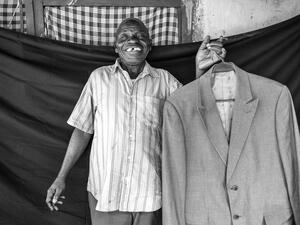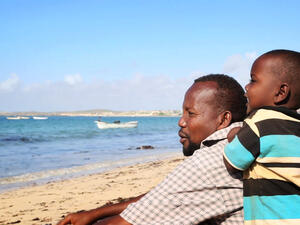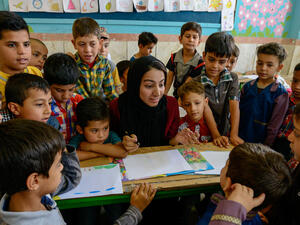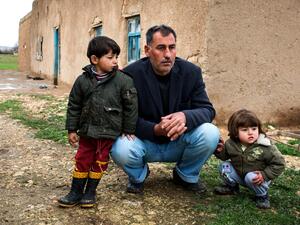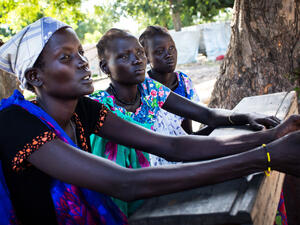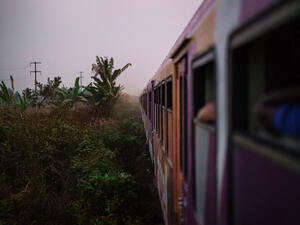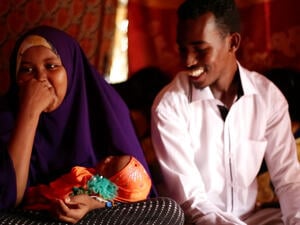Over half of Iraqi refugees in Iran have gone home, says UNHCR
Over half of Iraqi refugees in Iran have gone home, says UNHCR

Ansar camp in Khuzestan province, Iran, is now near empty and destroyed.
SHALAMSHEH BORDER CROSSING, Iran, Dec 16 (UNHCR) - "I am Iraqi, my flesh and blood are Iraqis, I will always be Iraqi, I cannot separate myself from Iraq. That is why I have to go back."
Mohammed Hossein is gazing west as he speaks. From where he stands, he can see his homeland across the narrow bridge that serves as the no man's land between Iran and Iraq at the Shalamsheh border crossing point in the south-west of Iran. In a few minutes, he will be home, after 14 years of living as a refugee in Iran.
Mohammed is 56 and comes from the Basra region in southern Iraq. He was a teacher before he had to flee Saddam Hussein's Iraq, but in Iran he was only able to work as a labourer in the local markets. He does not know what work he will be able to find in Basra, he's heard there are not many jobs to be had in Iraq right now. There's also a housing shortage, he's been told, and that's his biggest concern.
"Saddam Hussein destroyed everything," he said, "the place where we used to live is nothing now, there is no water anymore, we cannot stay there. I will go to my brother in Basra first. After that, I do not know where my family will live."
It is because conditions in Iraq are still so uncertain that the UN refugee agency does not encourage Iraqis to return home now. But it provides assistance to the thousands of refugees who, like Mohammed, do not want to wait. UNHCR is running regular convoys to Basra in the south and to northern Iraq for Kurdish refugees.
Until the spring of 2003, the Islamic Republic of Iran hosted over 202,000 Iraqi refugees, by far the largest registered refugee population from Iraq in the world. The majority were living in Iranian cities and settlements. About 50,000 of them, like Mohammed, stayed for many years in the 22 camps scattered across Iran's western provinces.
Since last year, more than half of all Iraqi refugees in Iran - an estimated 107,000 people - have returned to their homeland. Most of them have gone back of their own accord, some 12,500 with UNHCR assistance. The rate of departure has been even higher among refugees staying in camps, with more than 80 percent of them choosing to repatriate. This has led to a drastic fall in the overall camp population to 8,000 from 50,000. Six out of 22 camps are now empty, another two are expected to be closed by the end of the year. Of the remaining 14 camps, many are already near empty.
Ansar camp, in Khuzestan province, was Mohammed's home for the past 14 years. In May 2003, almost 7,000 people lived there. Today, there are less than 450 left, and in some camps only a few dozen refugees remain. Last year, Ansar was a bustling community, with shops, a lively school and a busy clinic; but with fewer and fewer refugees it is becoming increasingly difficult to keep running these services. In order to guarantee that remaining refugees continue to have access to all services, UNHCR is working with the Iranian authorities on a phased programme to close some of the remaining camps and consolidate others.
Five of Mohammed's seven children were born in Ansar camp and went to school there. Only Ali, his first-born, has memories of Iraq. Ali is now 18, old enough to be starting university soon, and he wants to study in Iraq. This is where he will build his life, he says, and it makes sense for him to get his diploma there. But he knows it will not be easy, he shares his father's anxiety about what life will be like in Basra.
The refugee agency is working closely with the Iraqi authorities to help refugees like Mohammed build a new life in their own country. The focus of UNHCR's work is to strengthen the capacity of local communities to reintegrate the refugees, by running shelter-building programmes, water projects and income-generating initiatives with its implementing partners on the ground.

Iraqi refugee children receive mine-awareness training before crossing back to Iraq from Iran.
Mohammed worries his family faces an uncertain future, but he also believes that things will get better, and that he has a role to play in building a new Iraq.
"I hope," he says, "that if honest hands are united and countries that care about human rights address the problem of Iraq seriously and support Iraqis in carrying out elections, I hope it will end all this confusion and that the rule of law will be restored. It is very important to me, to all of us."
By Marie-Hélène Verney
with reporting by Xavier Creach in Iran



